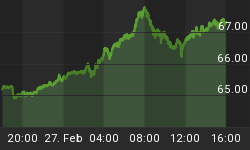Where money was tight, suddenly it's all arrived at once. Just like trouble does...
Everywhere we look, investors suddenly see nothing but blue skies, plain sailing ahead. Their change of heart makes us nervous, writes Adrian Ash at BullionVault.
New York's S&P index is back where it stood in July 2007 - right before the global credit crunch first bit, eating more than half the stock market's value inside 2 years...
Japan's Nikkei index has jumped by one third since mid-Nov., thanks to export companies getting a 20% drop in the Yen - the currency's fastest drop since right before the Asian Crisis of 1997...
And here in the UK - where the FTSE-100 stock index just enjoyed its strongest January since 1989, when house prices then suffered their biggest post-war drop - average house prices are rising year-on-year, even as the economy shrinks...
The common factor? Zero interest rates and money creation on a scale never tried outside Weimar Germany or Mugabe's Zimbabwe. Only the Eurozone has stood aside so far, and even then only a little. And yet gold and silver - the most sensitive assets to money inflation - are worse than becalmed.
Daily swings in the silver price haven't been this small since spring 2007. Volatility in the gold price has only been lower than Thursday this week on 15 days since the doldrums of mid-2005. Back then the Dollar also steadied and rose after multi-year falls. Industrial commodities outperfomed 'safe haven' gold too - a pattern echoed here in early 2013 by the surge in the price of useful platinum over industrially 'useless' gold.
Perhaps the flat-lining points to better times ahead. Gold after all is where retained capital hides when things are bad - a store of value to weather the storm. Or it may signal itchy feet in the 'hot money' crowd, now moving back into stocks and shares instead. But we can't shake the feeling that something awful is afoot. Gold and silver aren't making headlines today. Just like they didn't before the financial crisis began.
"Japan is on an unsustainable path of a strong Yen and deflation," wrote Andy Xie - once of Morgan Stanley, now director of Rosetta Stone Advisors - back in March 2012.
"The unprofitability of Japan's major exporters and emerging trade deficits suggest that the end of this path is in sight. The transition from a strong to weak Yen will likely be abrupt, involving a sudden and big devaluation of 30 to 40 percent."
Already since the Abe-nomic revolution announced in November the Yen has dropped more than 20% versus the Dollar. But "there is plenty of liquidity still parked in the Yen," Xie noted this week. Quite apart from the shock to America's trade deficit which surging shale-oil supplies deliver, "The Dollar bull is due less to the United States' strengths than the weaknesses in other major economies," he adds. And reviewing the last two major counter-trend rallies in the Dollar's otherwise permanent decline, "The first dollar bull market in the 1980s triggered the Latin American debt crisis, the second the Asian Financial Crisis. Neither was a coincidence."
Neither of those crises coincided with a bull market in gold or silver. Savers worldwide chose Dollars instead as the hottest emerging-market investments collapsed. But then neither of those slumps saw emerging-market central banksso stuffed with money, nor gold and silver so freely available to their citizens.
China's gold imports almost doubled last year, with net demand overtaking India for the world's #1 spot at last. This week the People's Bank of China pumped a record CNY860bn into the money markets ($140bn), crashing Shanghai's interbank interest rates by almost the whole one-percent point they had earlier spiked ahead of the coming New Year's long holidays.
The disparity, meantime, between the doldrums in precious metals and the bull market in Dollar-Yen trading can be seen by glancing at the US derivatives market. Yesterday the CME Group ![]() cut margin requirements on gold and silver futures. It raised the
cut margin requirements on gold and silver futures. It raised the ![]() margin payments needed to play the Yen's lightening drop. One of those moves is likely bullish, short-term. But you'd to borrow money to choose.
margin payments needed to play the Yen's lightening drop. One of those moves is likely bullish, short-term. But you'd to borrow money to choose.
Western pension funds are meanwhile pulling out of commodities, and just as liquidity floods back into the market. Both the Wall Street Journal and the Financial Times report how big institutions have quite hard assets "after finding they did little to protect their portfolios against inflation risk and the unpredictable returns of stocks." One of the biggest commodity hedge funds, Clive Capital has shrunk from $5 billion under management two years ago to less than $2bn today. And yet European banks - the major source of credit to commodities traders - are now reviving their commodities lending.
"The sector came close to panic 18 months ago," says the FT. But now "The banks want to be again my best friend," says a Swiss executive. "Funding concerns have now substantially dissipated," says SocGen's head of natural resources and energy finance, Federico Turegano.
There's plenty of money around to borrow, in short. Whether in Chinese banking, currency betting or commodities trading, where there was very little at all, suddenly it's all turned up at once. Which is just how trouble arrives. All that central-bank liquidity and quantitative easing has so far left consumer-priceinflation unmoved, too.















